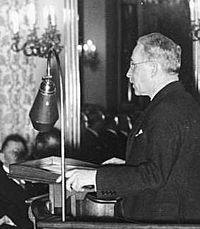Paul Freiherr von Eltz-Rübenach facts for kids
Quick facts for kids
Paul Freiherr von Eltz-Rübenach
|
|
|---|---|

Eltz-Rübenach at a news conference, 1935
|
|
| Reich Postal Minister | |
| In office 1 June 1932 – 2 February 1937 |
|
| President | Paul von Hindenburg (1932–1934) Adolf Hitler (1934–1937; as Führer) |
| Chancellor | Franz von Papen (1932) Kurt von Schleicher (1932–1933) Adolf Hitler (1933–1937) |
| Preceded by | Georg Schätzel |
| Succeeded by | Wilhelm Ohnesorge |
| Reich Minister of Transport | |
| In office 1 June 1932 – 2 February 1937 |
|
| Preceded by | Gottfried Treviranus |
| Succeeded by | Julius Dorpmüller |
| Personal details | |
| Born | 9 February 1875 Wahn, Rhine Province, German Empire |
| Died | 25 August 1943 (aged 68) Linz am Rhein, Rhine Province, Nazi Germany |
| Nationality | German |
| Alma mater | Aachen University Technical College Charlottenburg |
| Occupation | Architect |
Paul Freiherr von Eltz-Rübenach was an important German politician. He was born on February 9, 1875, and passed away on August 25, 1943. From 1932 to 1937, he served as the Minister for Postal Services and the Minister for Transport in Germany.
Contents
Early Life and Career
Paul von Eltz-Rübenach was born in a town called Wahn, which is now part of Cologne. He came from a noble family in the Rhineland area of Germany.
He studied engineering at two well-known universities: Aachen University and the Technical University of Berlin. After his studies, he started working for the state railroad service.
From 1911 to 1914, he lived in the United States. He worked as a technical expert at the German consulate in New York City. When World War I began, he returned to Germany. There, he helped with military rail transport. In 1924, he became the head of the Deutsche Reichsbahn Board in Karlsruhe, which managed the German national railway system.
His Time in Government
On June 1, 1932, Paul von Eltz-Rübenach was chosen to be a minister. He became the Reichsminister (a top government official) for both the Reich Ministry of Transport and the Reich Postal Ministry. He was considered a "technocrat," meaning he was chosen for his skills and knowledge, not because he belonged to a political party. He served under Chancellor Franz von Papen.
He kept his jobs as minister when Kurt von Schleicher became Chancellor in December 1932. He also continued in his roles when Adolf Hitler became Chancellor in January 1933, after the Nazi party took power.
Challenges as Minister
While he was a minister, Eltz-Rübenach tried to improve the railroads. However, the government, especially the Nazis, wanted to focus more on building a new highway system called the Reichsautobahn. He didn't succeed in getting as much support for the railroads as he hoped. He was also a member of the Academy for German Law, a group that advised on legal matters.
Standing Up for His Beliefs
In 1937, after four years of Nazi rule, Hitler wanted all ministers who were not Nazis to join the Nazi Party. He even offered them a special award called the Golden Party Badge.
Paul von Eltz-Rübenach was a strong Catholic. He was worried about the growing problems between the Nazi government and the Catholic Church. At a government meeting on January 30, 1937, he refused to accept the Golden Party Badge directly from Hitler. He also asked Hitler to explain his plans for the Church. This was a very brave thing to do, and the other ministers were very quiet. Because of his actions, Eltz-Rübenach had to resign from his positions.
Later, his wife also refused a Nazi award called the Cross of Honour of the German Mother. After this, he and his family were watched closely by the Gestapo, which was the Nazi secret police. His pension, which was money he was supposed to receive after leaving his job, was also stopped for a while.
Paul von Eltz-Rübenach passed away in Linz am Rhein in 1943. He was 68 years old.
See also
 In Spanish: Paul Freiherr von Eltz-Rübenach para niños
In Spanish: Paul Freiherr von Eltz-Rübenach para niños
 | Janet Taylor Pickett |
 | Synthia Saint James |
 | Howardena Pindell |
 | Faith Ringgold |

